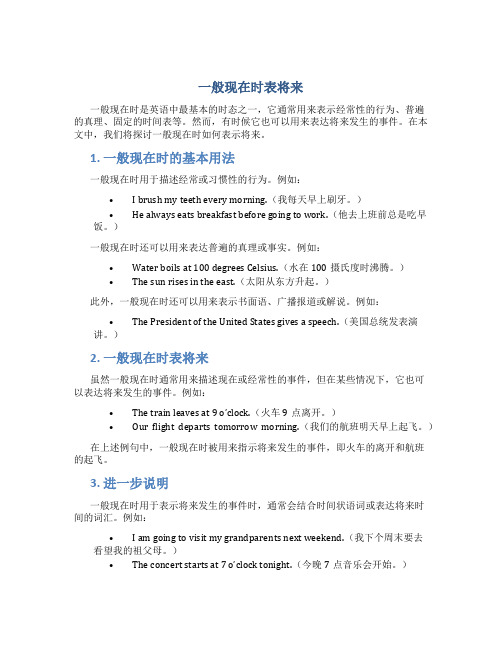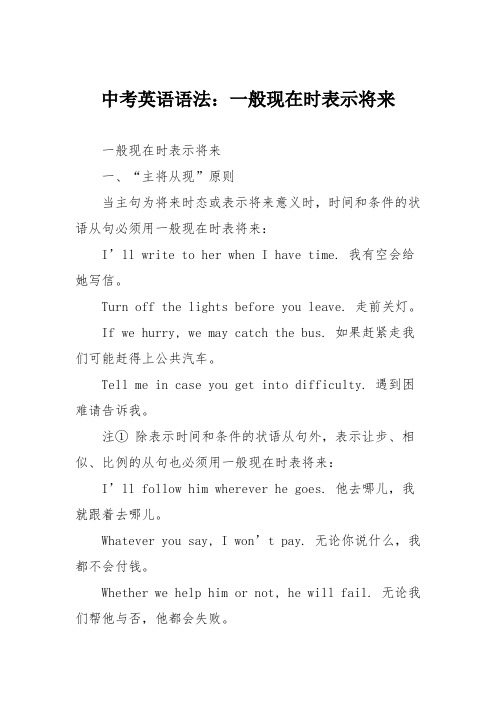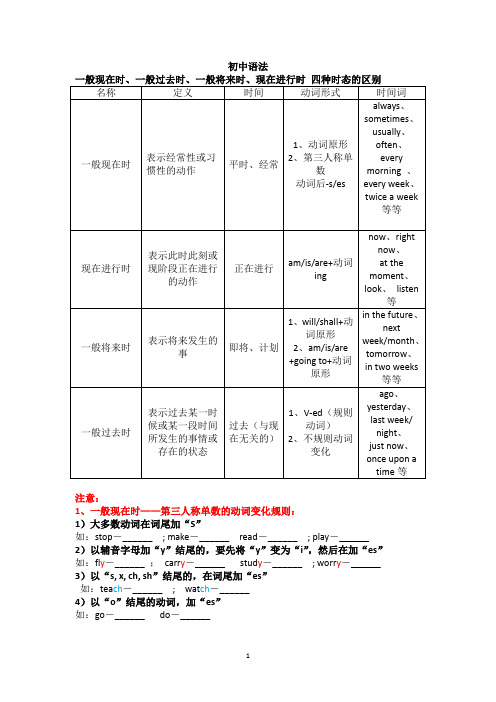2018初中英语语法之一般现在时表示将来情况
一般现在时表将来

一般现在时表将来一般现在时是英语中最基本的时态之一,它通常用来表示经常性的行为、普遍的真理、固定的时间表等。
然而,有时候它也可以用来表达将来发生的事件。
在本文中,我们将探讨一般现在时如何表示将来。
1. 一般现在时的基本用法一般现在时用于描述经常或习惯性的行为。
例如:•I brush my teeth every morning.(我每天早上刷牙。
)•He always eats breakfast before going to work.(他去上班前总是吃早饭。
)一般现在时还可以用来表达普遍的真理或事实。
例如:•Water boils at 100 degrees Celsius.(水在100摄氏度时沸腾。
)•The sun rises in the east.(太阳从东方升起。
)此外,一般现在时还可以用来表示书面语、广播报道或解说。
例如:•The President of the United States gives a speech.(美国总统发表演讲。
)2. 一般现在时表将来虽然一般现在时通常用来描述现在或经常性的事件,但在某些情况下,它也可以表达将来发生的事件。
例如:•The train leaves at 9 o’clock.(火车9点离开。
)•Our flight departs tomorrow morning.(我们的航班明天早上起飞。
)在上述例句中,一般现在时被用来指示将来发生的事件,即火车的离开和航班的起飞。
3. 进一步说明一般现在时用于表示将来发生的事件时,通常会结合时间状语词或表达将来时间的词汇。
例如:•I am going to visit my grandparents next weekend.(我下个周末要去看望我的祖父母。
)•The concert starts at 7 o’clock tonight.(今晚7点音乐会开始。
)在这些例句中,时间状语词。
表示将来的时态(一般现在时表将来,现进表将来以及一般将来时)

一般现在时
在时间和条件状语从句中可用一般现在时代替
一般将来时。 I’ll let you know as soon as I hear from him. 我一接到他的信就告诉你。
现在进行时
有些动词,如come, go, leave, return, arrive,
begin, start等,它们的现在进行时可表示不远 的将来要发生的事情。例如: Flight 1095 is landing soon. 第1095号航班马上要着陆了。
Байду номын сангаас(
)5. Look! Some visitors __ for the bus over there. (2015南宁) A. are waiting B. is waiting C. waiting D. Wait
( (
) 6. ---What were you doing at 5:30 yesterday afternoon? --- I ______ with Sam.(2016 钦州) A. walk B. walks C. was walking D. walked )7. — What are you going to do tomorrow?(2014 柳州) — I ______ visit my aunt. A. went to B .go to C. am going to
一般将来时
一般将来时是表示从现在开始将来要发生的事。 肯定句构成: be going to do sth. will / shall do sth. 其中 will 可用于任何人称, 而 shall 只可以用于第一人称 三.否定句及一般疑问构成: 1. be going to do sth. 在be动词后面加not;一般疑问句将be动词 放在句首。 2. 2. will / shall do sth.否定结构在 will 后加 not, 缩写为 won’t ;一般疑问句将 will 提放句首。 四、常用的时间状语: tomorrow, next week, soon, in the future, in two days等等。
一般现在时表将来的几种情况只是分享

一般现在时表将来的几种情况:1)下列动词come,go,arrive,leave,start,begin,return的一般现在时可以表示将来,主要用来表示在时间上已确定或安排好的事情.例如:The train leaves at six tomorrow morning.火车明天上午六点开.When does the bus star?It stars in ten minutes.汽车什么时候开?十分钟后.2)以here,there等开始的倒装句,表示动作正在进行.例如:Here comes the bus.= The bus is coming.车来了.There goes the bell.= The bell is ringing.铃响了.3)在时间或条件句中.例如:When Bill comes (不是will come),ask him to wait for me.比尔来后,让他等我.I'll write to you as soon as I arrive there.我到了那里,就写信给你.4)在动词hope,take care that,make sure that等的宾语从句中.例如:I hope they have a nice time next week.我希望他们下星期玩得开心.Make sure that the windows are closed before you leave the room.离开房间前,务必把窗户关了.现在进行时除表进行外,还可以表示将来.现在进行时表将来时常用“意图”“安排”或“打算”的含义.这种现在进行时比较生动,给人一种期待感.1.它常表最近或较近的将来,所用动词多是转移动词.如:(1) I’m going.我要走了.(2) I'm coming.我要来了.(3) When are you starting?你什么时候动身?2.表将来的现在进行时除用于转移动词外,亦可用于某些非转移动词.如:(1) I’m meeting you after class.课后我找你.(2) What are you doing next Sunday?下星期你打算干什么?(3) She is buying a new bike soon.她不久将买一辆新自行车.3.但偶尔也表示较远的将来.如:When I grow up,I’m joining the army.我长大了要参军.4.表将来的现在进行时有时含有“决心”的意思,多用在否定结构中.如:(1) I’m not going.我不走了.(2) I’m not waiting any longer.我不再等了.5.有时也用在肯定结构中.如:I’m backing out.我要打退堂鼓了.6.用这种现在进行时与对方讲话时可变成命令,不过语气比较温和.如:(1) You are staying.你留下吧.(2) Don’t forget:you are taking part too.不要忘记:你也要参加.7.同一般现在时一样,现在进行时也可在时间、条件或原因状语从句中表示将来.如:(1) when you are passing my way,please drop in.你什么时候路过我们家,请进来坐.(用于时间状语从句)(2) If they are not doing it,what am I to do?如果他们不干,那我该怎么办?(用于条件状语从句)(3) She is going to the dentist tomorrow because she is having a tooth filled.8.表示将来的现在进行时也可用在间接引语中,表示说话人相信它将是事实.如:He said he is going tomorrow.他说他明天走.9.表将来的现在进行时有时从属于将来时态.如:(1) On election night we’ll be telling you what’s happening in various places in this country.到了选举的夜晚,我们将把全国各地的情况告诉大家.(2) when I have time,I’ll come down to the school to see how you’re both doing.我有空时,会来学校看你们俩的学习情况.现在进行时态练习题一、.按要求改写句子1. The boy is playing basketball.否定句:____________________________一般疑问句:_________________________肯定回答:______________________否定回答:______________________对"is playing basketball"提问:__________________________对"The boy"提问:__________________________2. They are singing in the classroom.否定句:____________________________一般疑问句:_________________________肯定回答:____________________否定回答:______________________对"are singing"提问:__________________________对"in the classroom"提问:__________________________二、. 用现在进行时完成下列句子1. What _________ you __________ (do)?2. I _____________ (sing) an English song.3. What ________ he ____________ (mend)?4. He ______________ (mend) a car.5. ______ you __________ (fly) a kite? Yes, _____________.6. ______ she ___________ (sit) in the boat?7. ______ you _____________ (ask) questions?8. We _______________ (play) games now.9. What are you _________(do) now? I ___________(eat) bread.10. It's nine o'clock. My father_______________(work) in the office.11. Look, the boy____________(put) the rubbish into the bin.12. __________he__________(clean) the classroom? No, he isn't. He____________(play).13. Where is Max? He___________(run) on the grass.14. Listen, who____________(sing) in the music room?Oh, Mary_____________(sing) there.过去进行时态练习题过去进行时练习:用动词的适当形式填空.1.While we __________ (wait) for the bus,a girl __________ (run) up to us.2.I __________ (telephone) a friend when Bob __________ (come) in.3.Jim __________ (jump) on the bus as it __________ (move) away.4.We __________ (test) the new machine when the electricity __________ (go) off.5.She __________ (not want) to stay in bed while the others ________________ (all,work) in the fields.6.While mother ________ (put) Cathy to bed,the door bell ________ (ring).7.I _____ (have) my breakfast at half past six yesterday morning.8.Mary _____ (go) over her lessons from six to seven last night.John and peter____(do) the same thing.9.What _____ you ___ (do) at that time?We _____ (watch) TV.10.Was your father at home yesterday evening?Yes ,he was.He _____ (listen) to the radio.11.They _____(not make) a model ship when I saw him.12._____ they ____ (have) a meeting at 4 yesterday afternoon?No,they _____.They _____ (clean) the classroom.13.______ it ______(rain) when you left school?Yes,it ____.(No,it ____)14.What _____ your father _____ (do) when he was your age?15.One day,Edison _____ (wait) for a train to arrive,and suddenly a little boy ran to the track(轨道) to play.16.He asked me if I ______ (go) fishing that afternoon.17.The three of them were in a hurry because their plane _____ (leave) in five minutes.18.In a letter,john told us that he _____ (come) to china next month.19.When the bell rang,jenny _____ (wait) in her seat.20.She _____ (make) her dress the whole afternoon.21.While my father ____ (look) through the evening paper,he suddenly ____ a cry.。
中考英语语法:一般现在时表示将来

中考英语语法:一般现在时表示将来一般现在时表示将来一、“主将从现”原则当主句为将来时态或表示将来意义时,时间和条件的状语从句必须用一般现在时表将来:I’ll write to her when I have time. 我有空会给她写信。
Turn off the lights before you leave. 走前关灯。
If we hurry, we may catch the bus. 如果赶紧走我们可能赶得上公共汽车。
Tell me in case you get into difficulty. 遇到困难请告诉我。
注① 除表示时间和条件的状语从句外,表示让步、相似、比例的从句也必须用一般现在时表将来:I’ll follow him wherever he goes. 他去哪儿,我就跟着去哪儿。
Whatever you say, I won’t pay. 无论你说什么,我都不会付钱。
Whether we help him or not, he will fail. 无论我们帮他与否,他都会失败。
I’ll have a good time whether I win or lose. 赢也好,输也好,我都将会玩好。
The more you eat, the fatter you will become. 你吃得越多就会越胖。
② 另外,当主句为用将来时态时,定语从句也通常用一般现在时表将来:I’ll give you anything you ask for. 你要什么我都给你。
You can have anything I find. 我找到的任何东西你都可以拿去。
Everyone who comes first will get a present. 每个先来的人都可得到一份礼物。
二、简化原则按照英语习惯,一个句子中若主要动词已经表明了所谈论动作的时间,那么与之相关的其他动词就不必再次指明同一时间,而往往使用一个比较简单的时态,如用一般现在时表示一般将来时等。
一般现在时和现在进行时表将来的讲解

一般现在时和现在进行时表将来的讲解一现在进行时表示将来现在进行时表示将来,主要用于表示按计划或安排要发生的动作;常有“意图”“安排”或“打算”的含义;这种现在进行时比较生动,给人一种期待感; 它常表最近或较近的将来,所用动词多是转移动词; 表将来的现在进行时除用于转移动词外,亦可用于某些非转移动词;能这样用的动词常用的有:arrive, come, do, get, go, have, leave, meet, play, return, see, spend, start, stay, wear, work 等;如:I’m leaving tomorrow. 我明天走;They’re getting married next month. 他们下个月结婚;Are you meeting Bill this evening 你今晚将和比尔见面吗1 come, go, stay, arrive, leave 等词的现在进行时经常用来表示将来确切的计划;2 表示交通方式、行程安排的动词,例如fly,walk, ride, drive, takea bus, a taxi等的现在进行时也经常用于表示将来;但偶尔也表示较远的将来;如:When I grow up, I’m joining the army. 我长大了要参军;3表将来的现在进行时有时含有“决心”的意思,多用在否定结构中;如:I’m not going. 我不走了;I’m not waiting any longer. 我不再等了;有时也用在肯定结构中;如:I’m backing out. 我要打退堂鼓了;4用这种现在进行时与对方讲话时可变成命令,不过语气比较温和;如:You are staying. 你留下吧;Don’t forget: you are taking part too. 不要忘记:你也要参加;5现在进行时也可在时间、条件或原因状语从句中表示将来;如:when you are passing my way, please drop in. 你什么时候路过我们家,请进来坐;用于时间状语从句If they are not doing it, what am I to do 如果他们不干,那我该怎么办用于条件状语从句She is going to the dentist tomorrow because she is having a tooth filled.6表示将来的现在进行时也可用在间接引语中,表示说话人相信它将是事实;如:He said he is going tomorrow. 他说他明天走;表将来的现在进行时有时从属于将来时态;如:On election night we’ll be telling you what’s happening in various places in this country. 到了选举的夜晚,我们将把全国各地的情况告诉大家;when I have time, I’ll come down to the school to see how you’re both doing. 我有空时,会来学校看你们俩的学习情况;when 引导的条件状语从句,主将从现二一般现在时表将来1.“主将从现”原则当主句为将来时态或表示将来意义时,时间和条件的状语从句必须用一般现在时表将来:I’ll write to her when I have time. 我有空会给她写信;Turn off the lights before you leave. 走前关灯;If we hurry, we may catch the bus. 如果赶紧走我们可能赶得上公共汽车;Tell me in case you get into difficulty. 遇到困难请告诉我;注①除表示时间和条件的状语从句外,表示让步、相似、比例的从句也必须用一般现在时表将来:I’ll follow him wherever he goes. 他去哪儿,我就跟着去哪儿;Whatever you say, I won’t pay. 无论你说什么,我都不会付钱;Whether we help him or not, he will fail. 无论我们帮他与否,他都会失败;I’ll have a good time whether I win or lose. 赢也好,输也好,我都将会玩好;The more you eat, the fatter you will become. 你吃得越多就会越胖;②另外,当主句为用将来时态时,定语从句也通常用一般现在时表将来:I’ll give you anything thatyou ask for. 你要什么我都给你;You can have anything I find. 我找到的任何东西你都可以拿去;Everyone who comes first will get a present. 每个先来的人都可得到一份礼物;2、简化原则按照英语习惯,一个句子中若主要动词已经表明了所谈论动作的时间,那么与之相关的其他动词就不必再次指明同一时间,而往往使用一个比较简单的时态,如用一般现在时表示一般将来时等;比较:This discovery means that we will spend less on food.这一发现意味着我们将减少在食品上的花费;3、几种值得注意的情况在make sure弄清楚,make certain弄清楚,take care注意,当心,be careful注意,当心,mind注意,watch注意等后的that从句中通常也只用一般现在时表将来意义:Take care that it does not occur again. 注意别再发生这样的事;We must take care that no one sees us. 我们必须注意别让人看见我们;Make sure you come back soon. 你要保证快点回来;Be careful that you don’t hurt her feelings. 当心别伤了她的感情.Watch that the baby doesn’t go near the heater. 注意别让宝宝接近加热器;Mindthat you read the examination questions carefully before you begin to answer them.在答题前要注意仔细阅读考题;注在it doesn’t matter, I don’t care, I don’t mind等结构以及类似结构后的名词性从句也通常用一般现在时表将来意义:It doesn’t matter where we go on holiday. 我们去哪儿度假都行;Does it matter who goes first 谁先去这有关系吗I don’t care whether we win or lose. 我不在乎我们是赢还是输;Don’t you care what happens to them 难道你不关心他们出什么事了4、可用两种时态的情况在I hope , I bet, see to it等后的宾语从句中通常用一般现在时表示将来意义,但有时也可直接用将来时态:I hope that you like will like it. 你希望你会喜欢它;I bet it rains will rain tomorrow. 我打赌明天会下雨;See to it that children don’t catch cold. 当心别让孩子感冒;I’ll see that nobody disturbs will disturb you. 我将确保没人打扰你;注see to it 后的that从句通常用一般现在时表将来,直接用将来的情形较少见;5、用于比较状语从句6、在as, than 引出的比较状语从句中可用一般现在时表示将来,也可直接用将来时态:We’ll get there as soon as you do will. 你一到,我们就到;7、We’ll probably drive faster than you do will. 我们开车很可能比你快;8、6、表示计划或安排9、表示按规定、时间表、计划或安排要发生的动作:10、Are you on duty next weekend 下周末你上班吗11、The train leaves at 12:00. 火车12点开出;12、Where do we go now 我们现在到哪里去Her birthday is this time by next year..13、注用于此用法时,句中通常有具体的时间状语;14、7、by the time…15、当主句为将来时态时,与之相关的by the time后接的从句要用一般现在时表示将来意义:By the time he comes, I will have left. 等他到时,我会已离开了;16、The film will have started by the time we get to the cinema.我们到电影院时电影会已经开始了;8、表示现在将要宣布某事I declare the meeting open. 我宣布会议开始;We learn Lesson Ten today. 今天我们学习第10课;9、表示客观性很强的将来Today is Friday, so tomorrow is Saturday. 今天是星期五,所以明天是星期六;My birthday is on a Sunday this year. 我今年的生日在星期天;注有时说话者对某一将来事实非常肯定,也用一般现在时:The future is bright. 前途是光明的;Final victory is ours. 最后的胜利是我们的;三一般现在时与现在进行时表示将来时的区别例析1、共同点两者均可与时间状语连用表示已确定的将来安排;如:I leave am leaving the day after tomorrow.我预定后天走;The children start are starting school on Monday.孩子们星期一就要开学了;2、不同点1 从个人色彩来看原则上说,一般现在时比现在进行时具有的个人色彩更少;比较:I’m leaving tonight.可能指的是我决定要离开I leave tonight.可能指的是这是计划的一部分,但计划不一定是我订的2 从是否正式来看在通常情况下,一般现在时要比现在进行时听起来更为正式,比如计划开办一个新分店的百货商店很可能说:Our new branch opens next week. 本店新设分店下周开业;但不说:Our new branch is opening next week.3 从是否简洁来看有时,现在进行时显得累赘的地方就用一般现在时,例如在谈到像旅程安排那样的一系列预定的将来的动作时,可以这样说:We leave at six, arrive in Dublin at ten and take the plane on...我们6点出发,10点到达都柏林,并在……乘飞机……而不说:We are leaving at six, arriving in Dublin at ten and taking the plane on...4在动词hope, take care that, make sure that等的宾语从句中;例如:I hope they have a nice time next week. 我希望他们下星期玩得开心; Make sure that the windows are closed before you leave the room. 离开房间前,务必把窗户关了;五习题练习Ⅰ.用动词的适当形式填空151. Look, the bus is_______________ come2. We __________to Roman next week. go3. _________Shanghai in a few days. leave4. __________ you __________anything special tonight do5. We _______ _________ him after the performance. meet6. __________ his holiday take7. Are you ______________ home in the evening stay8. When_______ you __________ for London leave9. They are____________ at home for this weekend. relax10. Do you like going ___________ ride11. Look, he __________sit his brother.12. Beijing is a good place _________go sightseeing.13. She plans ________ study English. Plan to do something14. Look out The train ______________ leave.15. Keep quiet, I ___________ read a newspaper.II.句型转换101. We are going to the beach for weekend.一般疑问句________ ________ _______ to the beach for weekend2. The Greens are going bike riding for holiday.对划线部分提问________ ________ the Greens_________ for holiday3. They are going to Italy next week.对划线部分提问__________ _________ they __________ next week4. It’s about 4 li away from my home to school. 对划线部分提问___________________________________________.5. he, friends, now, his, with, play, football. 连词成句,并用正确时态_____________________________________________.III.单选_______ for Hong Kong on Saturday. Will you see me off at the airport √. am leaving B. am left C. am going to leave D. left _______ to see grandma and help her with some housework every week.√.am going to come comeare Mr and Mrs Black doing---They _______ tea in the garden.√.are drinking drunkmother often asks me ______ early.up up up √.to get up_______ to the park if it is fine tomorrow.√.will go goOne of the girls _______ the door.cleaning √.are cleaningyou don't feel well, you may just _________.reading √.stop reading to read to readis going to _________a game in our school this afternoon.√.beA little boy _______ the street.√.is crossing crossedmother is ill. I ______ stay at home and look after her.to √.must 主观上必须to 客观上必须Where's Mabel---She _____ pingpong behind the teaching building.playing √.is playing D.playing。
(完整版)一般现在时、一般过去时、一般将来时、现在进行时

初中语法注意:1、一般现在时——第三人称单数的动词变化规则:1)大多数动词在词尾加“S”如:stop-______ ; make-______ read-______ ; play-______ 2)以辅音字母加“y”结尾的,要先将“y”变为“i”,然后在加“es”如:fl y-______ ;carr y-______ stud y-______ ; worr y-______ 3)以“s, x, ch, sh”结尾的,在词尾加“es”如:tea ch-______ ; wat ch-______4)以“o”结尾的动词,加“es”如:go-______ do-______2、现在进行时——动词ing形式的变化规则1.一般动词直接在词尾+ing例:read→______ (读)talk→______(交谈)sing→______(唱歌)2.以不发音e结尾的动词,先去e再加ing例:lik e→______喜欢writ e→______写skat e→______(滑冰)3.以重读闭音节结尾且末尾只有一个辅音字母的动词,双写末尾字母,再加ing 例:sto p→______(停止)ge t→______(得到)4.少数几个以ie结尾的动词,变ie为f再加ing。
例:l ie→______(躺、撒谎)t ie→______(系、捆绑)3、一般过去时——动词的变化规则(1) 一般在动词后加-ed。
如:play-______, offer-______, weigh-______, destroy-______, sign-______(2) 在以字母e结尾的动词后,只加-d。
如:lik e-______, provid e-______, hat e- ______ dat e-______(3) 在以“辅音字母+y”结尾的动词后,则改y为i,再加-ed。
如:suppl y-______, stud y- ______.(4) 在以单短元音的重读闭音节结尾且,末尾只有一个辅音字母的动词后,双写最后一个辅音字母,再加-ed。
详解一般现在时表将来
详解一般现在时表将来(9种规律)一、当主句为将来时态或表示将来意义时,时间和条件的状语从句必须用一般现在时表将来:I’ll write to her when I have time. 我有空会给她写信。
Turn off the lights before you l eave. 走前关灯。
If we hurry, we may catch the bus. 如果赶紧走我们可能赶得上公共汽车。
Tell me in case you get into difficulty. 遇到困难请告诉我。
【注】① 除表示时间和条件的状语从句外,表示让步、相似、比例的从句也必须用一般现在时表示将来:I’ll foll ow him wherever he goes. 他去哪儿,我就跟着去哪儿。
Whatever you say, I won’t pay. 无论你说什么,我都不会付钱。
Whether we help him or not, he will fail. 无论我们帮他与否,他都会失败。
I’ll have a good time whether I win or l ose. 赢也好,输也好,我都将会玩好。
The more you eat, the fatter you will become. 你吃得越多就会越胖。
② 另外,当主句为用将来时态时,定语从句也通常用一般现在时表将来:I’ll give you anything you ask for. 你要什么我都给你。
You can have anything I find. 我找到的任何东西你都可以拿去。
Everyone who comes first will get a present. 每个先来的人都可得到一份礼物。
二、按照英语习惯,一个句子中若主要动词已经表明了所谈论动作的时间,那么与之相关的其他动词就不必再次指明同一时间,而往往使用一个比较简单的时态,如用一般现在时表示一般将来时等。
初中英语语法一般将来时
初中英语语法一般将来时一是表示将来的决定、承诺、意愿或预测;二是表示将来的惯或经常性动作;三是表示将来的突发事件。
going to则强调现在已经有了计划、安排或打算,即已经准备好要做某事了。
例如:I will call you later.(我会给你打电话。
)表示决定或承诺。
He will be a great doctor one day.(他将来会成为一名伟大的医生。
)表示预测。
I will always love you.(我将永远爱你。
)表示意愿。
We will have a meeting every Monday.(我们每周一都会开会。
)表示惯或经常性动作。
I will help you if you need it.(如果你需要,我会帮助你。
)表示突发事件。
She is going to study abroad next year.(她明年要出国留学。
)表示已经有了计划或打算。
一般现在时表示将来通常用于表示时间表或日程安排。
The train leaves at 8 am tomorrow.明天早上8点火车离开。
The conference starts on Monday.会议从星期一开始。
I have a dentist appointment next week.我下周有牙医约会。
1.The train will leave at six tomorrow morning。
indicating a future event that has already been led.2.The use of the future tense can also be seen in time or nal clauses。
as in "I'll write to you as soon as I arrive there" and "If it doesn't rain tomorrow。
一般现在时表将来的几种情况图文稿
一般现在时表将来的几种情况集团文件发布号:(9816-UATWW-MWUB-WUNN-INNUL-DQQTY-一般现在时表将来的几种情况:1)下列动词come,go,arrive,leave,start,begin,return的一般现在时可以表示将来,主要用来表示在时间上已确定或安排好的事情.例如:The train leaves at six tomorrow morning.火车明天上午六点开. When does the bus starIt stars in ten minutes.汽车什么时候开十分钟后. 2)以here,there等开始的倒装句,表示动作正在进行.例如:Here comes the bus.= The bus is coming..There goes the bell.= The bell is ringing.铃响了.3)在时间或条件句中.例如:When Bill comes (不是will come),ask to wait for me.比尔来后,让他等我.I'll write to you as soon as I arrive there.我到了那里,就写信给你.4)在动词hope,take care that,make sure that等的宾语从句中.例如:I hope they have a nice time next week.我希望他们下星期玩得开心.Make sure that the windows are closed before you leave the room.离开房间前,务必把窗户关了.现在进行时除表进行外,还可以表示将来.现在进行时表将来时常用“意图”“安排”或“打算”的含义.这种现在进行时比较生动,给人一种期待感.1.它常表最近或较近的将来,所用动词多是转移动词.如:(1) I’m going.我要走了.(2) I'm coming.我要来了.(3) When are you starting你什么时候动身2.表将来的现在进行时除用于转移动词外,亦可用于某些非转移动词.如:(1) I’m meeting y ou after class.课后我找你.(2) What are you doing next Sunday下星期你打算干什么(3) She is buying a new bike soon.她不久将买一辆新自行车.3.但偶尔也表示较远的将来.如:When I grow up,I’m joining the army.我长大了要参军.4.表将来的现在进行时有时含有“决心”的意思,多用在否定结构中.如:(1) I’m not going.我不走了.(2) I’m not waiting any longer.我不再等了.5.有时也用在肯定结构中.如:I’m backing out.我要打退堂鼓了.6.用这种现在进行时与对方讲话时可变成命令,不过语气比较温和.如:(1) You are staying.你留下吧.(2) Don’t forget:you are taking part too.不要忘记:你也要参加.7.同一般现在时一样,现在进行时也可在时间、条件或原因状语从句中表示将来.如:(1) when you are passing my way,please drop in.你什么时候路过我们家,请进来坐.(用于时间状语从句)(2) If they are not doing it,what am I to do如果他们不干,那我该怎么办(用于条件状语从句)(3) She is going to the dentist tomorrow because she is having a tooth filled.8.表示将来的现在进行时也可用在间接引语中,表示说话人相信它将是事实.如:He said he is going tomorrow.他说他明天走.9.表将来的现在进行时有时从属于将来时态.如:(1) On election night we’ll be telling you what’s happening in various places in this country.到了选举的夜晚,我们将把全国各地的情况告诉大家. (2) when I have time,I’ll come down to the school to see how you’re both doing.我有空时,会来学校看你们俩的学习情况.现在进行时态练习题一、.按要求改写句子 1. The boy is playing basketball. 否定句:____________________________ 一般疑问句:_________________________ 肯定回答:______________________否定回答:______________________ 对"is playing basketball"提问:__________________________ 对"The boy"提问:__________________________ 2. They are singing in the classroom. 否定句:____________________________ 一般疑问句:_________________________肯定回答:____________________否定回答:______________________对"are singing"提问:__________________________对"in the classroom"提问:__________________________二、. 用现在进行时完成下列句子 1. What _________ you__________ (do)2. I _____________ (sing) an English song.3. What ________ he ____________ (mend) 4. He ______________ (mend) a car. 5. ______ you __________ (fly) a kite Yes,_____________. 6. ______ she ___________ (sit) in the boat 7. ______ you _____________ (ask) questions 8. We_______________ (play) games now. 9. What are you_________(do) now I ___________(eat) bread. 10. It's nineo'clock. My father_______________(work) in the office. 11. Look, the boy____________(put) the rubbish into the bin. 12.__________he__________(clean) the classroom No, he isn't.He____________(play). 13. Where is Max He___________(run) on the grass. 14. Listen, who____________(sing) in the music room Oh, Mary_____________(sing) there.过去进行时态练习题过去进行时练习:用动词的适当形式填空.1.While we __________ (wait) for the bus,a girl __________ (run) up to us.2.I __________ (telephone) a friend when Bob __________ (come) in.3.Jim __________ (jump) on the bus as it __________ (move) away.4.We __________ (test) the new machine when the electricity __________ (go) off.5.She __________ (not want) to stay in bed while the others ________________ (all,work) in the fields.6.While mother ________ (put) Cathy to bed,the door bell________ (ring).7.I _____ (have) my breakfast at half past six yesterday morning.8.Mary _____ (go) over her lessons from six to seven last night.John and peter ____(do) the same thing.9.What _____ you ___ (do) at that timeWe _____ (watch) TV.10.Was your father at home yesterday eveningYes ,he was.He _____ (listen) to the radio.11.They _____(not make) a model ship when I saw him.12._____ they ____ (have) a meeting at 4 yesterday afternoonNo,they _____.They _____ (clean) the classroom.13.______ it ______(rain) when you left schoolYes,it____.(No,it ____)14.What _____ your father _____ (do) when he was your age15.One day,Edison _____ (wait) for a train to arrive,and suddenly a little boy ran to the track(轨道) to play.16.He asked me if I ______ (go) fishing that afternoon.17.The three of them were in a hurry because their plane _____ (leave) in five minutes.18.In a letter,john told us that he _____ (come) to china next month.19.When the bell rang,jenny _____ (wait) in her seat.20.She _____ (make) her dress the wholeafternoon.21.While my father ____ (look) through the evening paper,he suddenly ____ a cry.。
一般现在时表将来用法总结
1. 当主句为将来时态或表示将来意义时,时间和条件的状语从句必须用一般现在时表将来。
如:I’ll write to her when I have time. 我有空会给她写信。
Turn off the lights before you leave. 走前关灯。
If we hurry, we may catch the bus. 如果赶紧走我们可能赶得上公共汽车。
Tell me in case you get into difficulty. 遇到困难请告诉我。
【注】①除表示时间和条件的状语从句外,表示让步、相似、比例的从句也必须用一般现在时表示将来。
如:I’ll follow him wherever he goes. 他去哪儿,我就跟着去哪儿。
Whatever you say, I won’t pay. 无论你说什么,我都不会付钱。
Whether we help him or not, he will fail. 无论我们帮他与否,他都会失败。
I’ll have a good time whether I win or lose. 赢也好,输也好,我都将会玩好。
The more you eat, the fatter you will become. 你吃得越多就会越胖。
②另外,当主句为用将来时态时,定语从句也通常用一般现在时表将来。
如:I’ll give you anything you ask for. 你要什么我都给你。
You can have anything I find. 我找到的任何东西你都可以拿去。
Everyone who comes first will get a present. 每个先来的人都可得到一份礼物。
2. 按照英语习惯,一个句子中若主要动词已经表明了所谈论动作的时间,那么与之相关的其他动词就不必再次指明同一时间,而往往使用一个比较简单的时态,如用一般现在时表示一般将来时等。
- 1、下载文档前请自行甄别文档内容的完整性,平台不提供额外的编辑、内容补充、找答案等附加服务。
- 2、"仅部分预览"的文档,不可在线预览部分如存在完整性等问题,可反馈申请退款(可完整预览的文档不适用该条件!)。
- 3、如文档侵犯您的权益,请联系客服反馈,我们会尽快为您处理(人工客服工作时间:9:00-18:30)。
2018初中英语语法之一般现在时表示将来情况
各位读友大家好,此文档由网络收集而来,欢迎您下载,谢谢
新一轮中考复习备考周期正式开始,中考网为各位初三考生整理了中考五大必考学科的知识点,主要是对初中三年各学科知识点的梳理和细化,帮助各位考生理清知识脉络,熟悉答题思路,希望各位考生可以在考试中取得优异成绩!下面是《2018初中英语语法之一般现在时表示将来情况》,仅供参考!一般现在时表示将来情况
1)在口语中,一般现在时可以表示按规定、计划或时间表要发生的事,通常都有一个表示未来时间的状语:
The plane takes off at 9:20 飞机早上九点二十分起飞。
Their delegation arrives here
tomorrow afternoon. 他们的代表团明天下午到达。
I’m in my office from two to five this afternoon. 今天下午两点到五点我在办公室。
When does the the play begin? 戏几点开始?
The train leaves in five minutes’time. 火车五分钟后离开。
Are you free tonight? 今晚你有空吗?
有时可用这个时态叙述整个计划:
We leave London at 10:00 next Tuesday and arrive in Paris at 13:00. We spend two hours
in Paris and leave again at 15:00. We arrive in Rome at 19:30, spend four hours in Rome.
我们下周二上午十点离开伦敦,下午一点抵达巴黎。
在巴黎停留两小时,三点再次
出发。
晚七点半到达罗马,在罗马
待四个小时。
2)在时间或条件从句中,须用一般现在时表示将来动作:
If I see Nancy I’ll ask her. 如果我见到南希我会问她。
I’ll discuss this with you when we meet. 我们见面时我将和你商讨此事。
I’ll tell her after you leave. 你走之后我再告诉她。
We’ll let you know as soon as you arrive. 你一到我们就告诉你。
In case I forget, please remind me about it. 万一我忘了,请提醒我。
I won’t write unless her writes first. 除非他先来信,否则我不会给他写信。
3)还有一些其他从句中,可以用一般现在时表示将来动作:
I hope that you feel better soon. 我希望不久你能感觉好一点。
Suppose he doesn’t come, shall we go without him? 假如他不来,我们就自己去吗?
Assuming it rains tomorrow, what shall we do? 假定明天下雨,我们该怎么办?
I’ll just say whatever comes into my head. 我将想到什么就说什么。
Come and stay as long as you please. 你来爱待多久就待多久。
I’ll get the car fixed no matter how much it costs. 不管花多少钱我都得让人把车修好。
Whatever happens, I’m going. 不管发生什么情况我都要去。
However long you argue, you will never convince him.
不管辩论多久,你永远说服不了他。
各位读友大家好,此文档由网络收集而来,欢迎您下载,谢谢。
